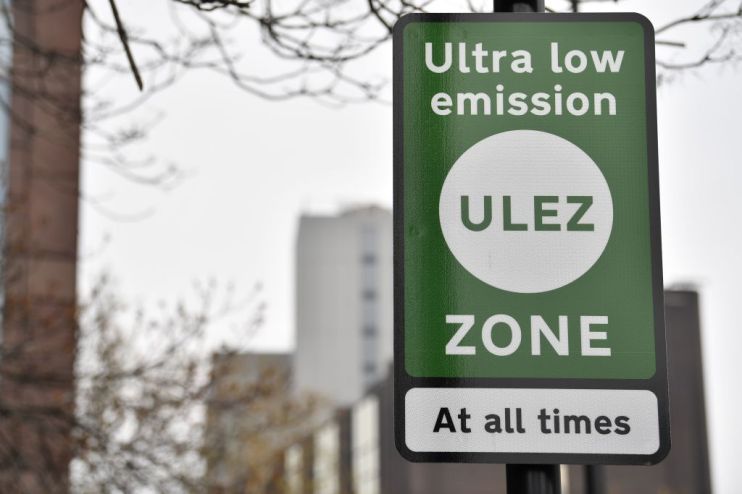ULEZ expansion a ‘money-raising exercise’, says Transport Secretary

The expansion of the ultra-low emission zone (ULEZ) to all London boroughs is not about air pollution but a “money-raising exercise”, the Transport Secretary has said.
On Tuesday, London became the world’s largest pollution charging area after ULEZ was expanded to include the whole of the capital.
People who drive in the zone in a vehicle that does not meet minimum emissions standards are now required to pay a £12.50 daily fee or risk a £180 fine, reduced to £90 if paid within 14 days.
London mayor Sadiq Khan has faced strong opposition to the scheme, although a £160 million scheme run by Transport for London (TfL) enables residents, small businesses, sole traders and charities scrapping non-compliant cars to claim grants.
Speaking on GB News on Tuesday morning, Mark Harper said he would stop the rollout if he had the power to do so and highlighted his reservations about the true motives behind the expansion.
Meanwhile, in a separate round of interviews, the London mayor denied that extending ULEZ was “anti-car” and accused Mr Harper of “factual errors”.
The Transport Secretary said: “I don’t have the power to stop it coming into force. That’s a decision for the mayor of London backed by the Labour leader. I think he should think again.
“He says this has to do with air quality, his own impact assessment says this will only have a minor to negligible effect on air pollution.
“It’s not about air pollution, it’s about a money-raising exercise and this is absolutely not the time to be putting all those costs on hard-pressed and hard-working Londoners and those in the area outside London.”
Asked if he would put an end to the expansion if he had the power to do so, Mr Harper said: “Yes, I don’t have the power, though.”
Mr Harper explained on LBC’s Nick Ferrari programme that the Government will be backing an amendment to the Levelling-Up and Regeneration Bill to make changes to the 1999 law that created the role of mayor of London.
Under the amendment, brought forward by Tory peer Lord Moylan, London boroughs would be able to opt out of future Transport for London (TfL) clean air schemes if they are meeting air quality targets.
The Transport Secretary said: “One of the problems here is that a number of London local authorities don’t support this scheme coming into force, so for the future, we are backing an amendment, a backbench amendment to a piece of legislation which will mean in future any road user charging schemes like this would have to be also backed by London boroughs.
“And that’s important because if you look at the mayor of London’s own website for his Project 2030 scheme, he wants to roll out more road user charging schemes, pay-per-mile schemes across London.”
Rejecting some of Mr Harper’s claims, Mr Khan told BBC Breakfast: “I just bumped into Mark Harper as he was leaving the studio and I think he made a couple of factual errors, which is really worth me clarifying.
“If this was about making money, I’d have acceded to the demand from the Government to expand the congestion charge much wider than it currently is. That would have been a cash grab, but I said ‘no’.
“If it was a cash grab – as the Government is saying – just to raise money, I’d have acceded to their demand to expand the ULEZ without proper consultation and a proper scrappage scheme.
“This is about helping our air be cleaner. In a couple of years’ time, TfL have predicted there will be no additional money made because the number of non-compliant vehicles (will decrease), but every penny net made is used to reinvest in public transport, improving buses in outer London, improving public transport in our city.”
Speaking on Times Radio, the Labour mayor also ruled out a pay-per-mile scheme while he is in office, adding: “It’s not on the agenda, it’s not on the table.
“But it’s no secret that the Government, transport officials in London and around the country, have been looking at for some time, in relation to a smarter, streamlined service for a variety of reasons, not least because the Government are worried about fuel revenues drying up over the course of the next few years.
“In fact, Boris Johnson, when he was the mayor of London – remember him? – in his transport strategy there was talk about a pay-per-mile scheme.
“When Rishi Sunak was chancellor he asked his Treasury officials to look into these schemes.
“There’s no secrecy around this.”
To comply with Ulez standards, petrol cars must generally have been first registered after 2005, while most diesel cars registered after September 2015 are also exempt from the charge.
TfL says nine out of 10 cars seen driving in outer London on an average day are compliant.
Separate figures obtained by the RAC show more than 690,000 licensed cars in the whole of London are likely to be non-compliant.
This does not take into account other types of vehicles or those which enter London from neighbouring counties.
However, City Hall claims the RAC data is out of date and inaccurate.
Press Association – by Martina Bet and Neil Lancefield
